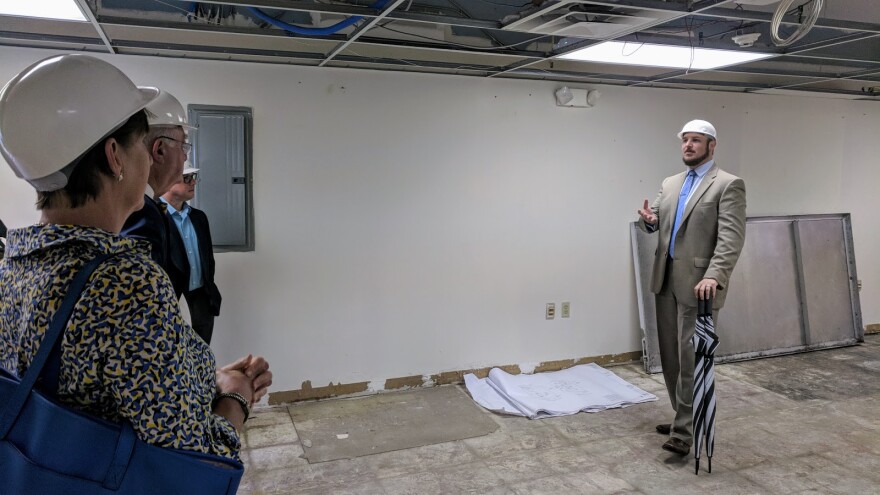A lack of employment opportunity, an excess of generational poverty and lack of access to financial institutions — and the fiscal literacy they provide — makes it difficult for many families to see their way out of hardship.
That’s that complicated web of issues a new Financial Opportunity Center is aimed at untangling in the New Town neighborhood just west of downtown Jacksonville.
The center, a first of its kind in Florida, is spearheaded by the local chapter of the national Local Initiatives Support Corp. community-development organization.
LISC Jacksonville Executive Director Janet Owens said it’s taken longer than expected to take the idea from paper to concrete. She said she first started gathering support from community organizations like the New Town Success Zone, Edward Waters College, the United Way and others in 2013.
“We’ve done this as an organization — LISC in partnership with local nonprofits — in more than 80 neighborhoods around the country, and we believe the partnership we’ve created here is going to create one of the most sustainable models,” she said.
Owens said the project is still months away from opening its doors. Right now, the old Edward Waters building that once housed the Black Men College Explorers Program is a gutted mess of exposed wires, plywood and termite damage.

But with a little vision, LISC Economic Development Officer Devin Thompson said it’s not hard to imagine throngs of families getting wrap-around financial services from a small but dedicated army of counselors and coaches.
Standing in first floor of the two-story building Friday, Thompson asked a tour group made up of community partners and benefactors to picture the large space lined with computers.
“This is a resource room. It doesn’t look like one today, but when this is done this will become a computer lab, serving as the day-to-day operational space for the participants who are working on their plans,” he said.
He said the room would sometimes function as a Volunteer Income Tax Assistance center, where IRS-certified volunteers will offer free tax help to people who generally make $54,000 or less, persons with disabilities and limited English-speaking taxpayers who need assistance in preparing their own tax returns.
The building was once a four-bedroom home before becoming part of EWC. When it officially opens its doors in early fall, the four rooms upstairs will become spaces for counseling, while the bottom floor will be used for classes, group coaching and day-to-day operations.
The staff hasn’t waited for the building to be refurbished before providing services, though. They’ve been occupying space in EWC’s Center for Health Disparities, where New Town Executive Director George Maxey works.
The cramped space has hosted a couple cohorts of around 20 participants in the program. Each person is assessed individually and works with a team of coaches who help them craft short-term goals, like saving more or paying off a credit card, and long-term ones — like career advancement or home ownership.
Participants’ teams meet with them regularly and track progress, sometimes for years, acting as cheerleaders and providing accountability. Progress data is shared between LISC centers around the country, helping centers crowdsource what does and doesn’t work.
An investigation by the public radio show Reveal this year found black and Latino applicants are twice as likely as white applicants to be denied conventional home loans, even when controlling for factors like income, gender, the amount of the loan. Borrowers’ credit scores were not included in the data because banks had successfully delayed implementation of a 2015 federal law requiring their reporting.
Reporters combed through more than 30 million conventional home loans given out in 2015 and 2016, and they found a pattern of denials across the country. Jacksonville, they say, is one of 61 metro areas with the largest disparities.
Bank representatives like VyStar Credit Union’s Cathy Bonaventura say denials are usually a result of low credit scores and high debt.
Bonaventura told WJCT earlier this year her institution does what it can to help borrowers become better candidates for conventional home loans.
“We also have some options — if budgeting is the issue — with our “money makeover” programs to help them learn about budgeting and getting their finances in order and rebuilding their credit,” she said.
But programs offered by banks are not always easily accessible. Owens calls New Town — and large swaths of Northwest Jacksonville — “financial deserts” because they lack lending institutions. She said that’s why the Financial Opportunity Center is so crucial.
“Typically where communities are faced with that, that is when you see predatory lenders coming into those

communities, and with those it is a huge opportunity to create bad money-management habits,” she said. “We work with families to turn those mistakes into opportunities to grow and develop the wealth that they need by that long-term, constant engagement.”
Since LISC started its financial literacy program late last year, Owens said the team has been able to help a handful of people find jobs and are working with many more to reach their goals.
Editor's Note: This story is part of WJCT’s Beyond the Core project, a listening tour designed to help us get to know the community and to help our audience get to know each other. Beyond the Core stories are based on what we hear at listening sessions. Please visit our Beyond the Core page for more information and to find out whether we’ll be in your neighborhood soon.
Ryan Benk can be reached at rbenk@wjct.org, 904-358-6319 or on Twitter at @RyanMichaelBenk.






